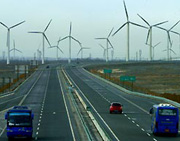|
 |
| A wind power
plant in Dabancheng, Northwest China's Xinjiang Uyguir Autonomous
Region, is viewed in this file photo taken on May 31, 2005.
(newsphoto) |
A State Council leader has called for a wider exploration of the
potentially oil-rich Xinjiang to make the region the country's strategic
oil and gas base.
During a recent visit to the Xinjiang Uygur Autonomous Region,
Vice-Premier Zeng Peiyan said efforts will be focused on the Tarim,
Junggar, and Turpan-Hami basins.
Zeng also said oil companies and local governments should look into
price reforms in the energy sector, the levying of a fuel tax and an
increase in the resources tax.
The basins, equivalent in size to France and
Britain, sit on 30 per cent of China's total oil and 34 per cent of its
natural gas reserves. But more than 80 per cent of the areas remains untapped
.
"Exploration in Xinjiang is still in an embryonic stage," said Zeng at
an oil and gas exploration meeting in Tarim on Sunday.
"We should strive to find large oil and gas fields, and make Xinjiang
the country's strategic oil and gas base."
Zeng visited major oil and gas fields in the Tarim Basin late last week
after completing a tour of Russia, Oman, the United Arab Emirates, and
Qatar - all major oil producers.
Xinjiang pumped 22 million tons of oil last year, or 12 per cent of the
nation's total.
Currently China's third largest oil producing region, Xinjiang plans to
more than double its oil production to 50 million tons by 2010.
The target, if realized, will place Xinjiang ahead of Daqing in the
northeast as the largest oil production base in China.
Beijing also sees Xinjiang as a frontier post from which to pump in
imported crude from Central Asian countries.
China and Kazakhstan are building a 1,200-kilometre cross-border oil
pipeline to bring in 10 million tons of crude annually from Kazakhstan to
Xinjiang.
The pipeline is expected to become operational by the end of the year
and plans are in place to double its capacity to 20 million tons in the
future.
The development of the oil and gas business will help drive the local
economy and create jobs, stabilizing a region where millions of people of
about a dozen ethnic minorities live, Beijing hopes.
But experts have warned the prospects of oil exploitation in the region
remain uncertain, given its complicated geography. And production costs
tend to be much higher than the east as oil companies have to drill deeper
in the deserts.
"It is highly risky to explore for oil and gas in Xinjiang," said a
veteran engineer with China National Petroleum Corp, the country's largest
oil producer.
"More importantly, Xinjiang is far from the major oil markets on the
east coast. High transportation costs will largely erode the profit
margins of oil companies," the engineer who did not want to be named said
yesterday in Beijing.
(China Daily) | 